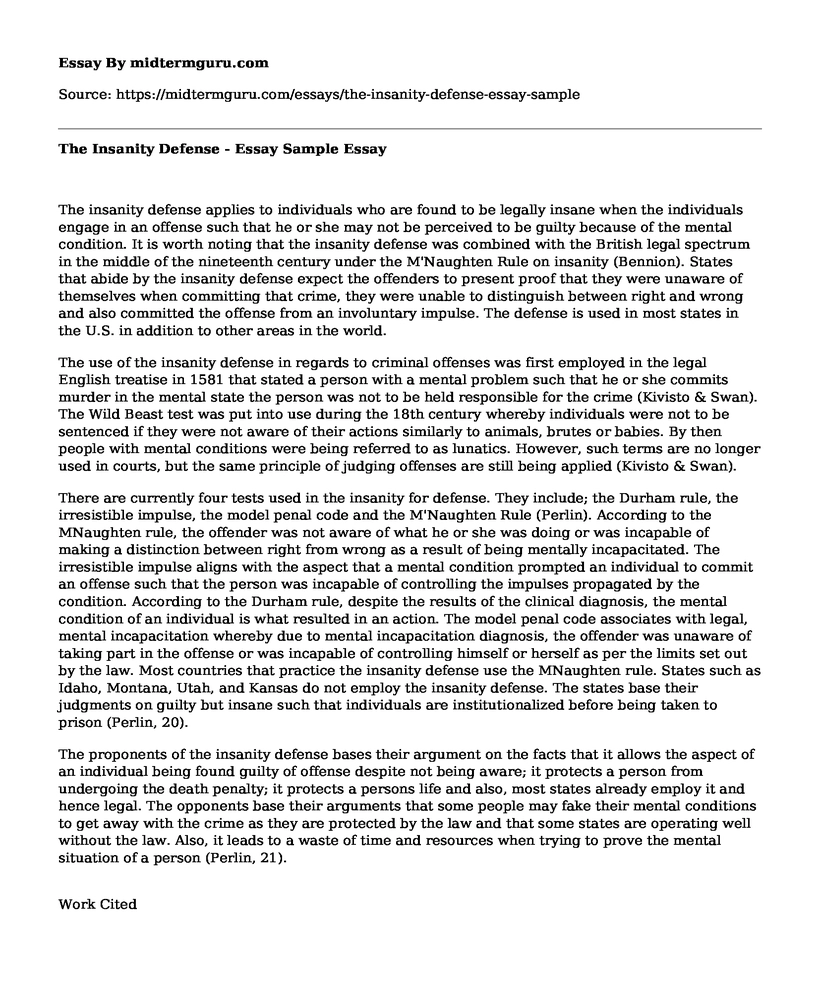The insanity defense applies to individuals who are found to be legally insane when the individuals engage in an offense such that he or she may not be perceived to be guilty because of the mental condition. It is worth noting that the insanity defense was combined with the British legal spectrum in the middle of the nineteenth century under the M'Naughten Rule on insanity (Bennion). States that abide by the insanity defense expect the offenders to present proof that they were unaware of themselves when committing that crime, they were unable to distinguish between right and wrong and also committed the offense from an involuntary impulse. The defense is used in most states in the U.S. in addition to other areas in the world.
The use of the insanity defense in regards to criminal offenses was first employed in the legal English treatise in 1581 that stated a person with a mental problem such that he or she commits murder in the mental state the person was not to be held responsible for the crime (Kivisto & Swan). The Wild Beast test was put into use during the 18th century whereby individuals were not to be sentenced if they were not aware of their actions similarly to animals, brutes or babies. By then people with mental conditions were being referred to as lunatics. However, such terms are no longer used in courts, but the same principle of judging offenses are still being applied (Kivisto & Swan).
There are currently four tests used in the insanity for defense. They include; the Durham rule, the irresistible impulse, the model penal code and the M'Naughten Rule (Perlin). According to the MNaughten rule, the offender was not aware of what he or she was doing or was incapable of making a distinction between right from wrong as a result of being mentally incapacitated. The irresistible impulse aligns with the aspect that a mental condition prompted an individual to commit an offense such that the person was incapable of controlling the impulses propagated by the condition. According to the Durham rule, despite the results of the clinical diagnosis, the mental condition of an individual is what resulted in an action. The model penal code associates with legal, mental incapacitation whereby due to mental incapacitation diagnosis, the offender was unaware of taking part in the offense or was incapable of controlling himself or herself as per the limits set out by the law. Most countries that practice the insanity defense use the MNaughten rule. States such as Idaho, Montana, Utah, and Kansas do not employ the insanity defense. The states base their judgments on guilty but insane such that individuals are institutionalized before being taken to prison (Perlin, 20).
The proponents of the insanity defense bases their argument on the facts that it allows the aspect of an individual being found guilty of offense despite not being aware; it protects a person from undergoing the death penalty; it protects a persons life and also, most states already employ it and hence legal. The opponents base their arguments that some people may fake their mental conditions to get away with the crime as they are protected by the law and that some states are operating well without the law. Also, it leads to a waste of time and resources when trying to prove the mental situation of a person (Perlin, 21).
Work Cited
Bennion, E. (2011). Death is different no longer: Abolishing the insanity defense is cruel and unusual under Graham v. Florida. DePaul Law Review, 61, 1-56.
Kivisto, A. J., & Swan, S. A. (2011). Attitudes toward the insanity defense in capital cases:(Im) partiality from Witherspoon to Witt. Journal of Forensic Psychology Practice, 11(4), 311-329.
Perlin, M. L. (2010). Too stubborn to ever be governed by enforced insanity: Some therapeutic jurisprudence dilemmas in the representation of criminal defendants in incompetency and insanity cases. International journal of law and psychiatry, 33(5), 475-481.
Cite this page
The Insanity Defense - Essay Sample. (2021, May 26). Retrieved from https://midtermguru.com/essays/the-insanity-defense-essay-sample
If you are the original author of this essay and no longer wish to have it published on the midtermguru.com website, please click below to request its removal:
- Paper Example on Organized Crime and Human Trafficking
- Paper Example on Municipal Courts Slam the Poor Hardest
- Paper Example on Brazilian Constitution
- Mass Incarceration: U.S. Leads World in Prison Population - Essay Sample
- Discrimination in the US: A Historical Persistence Since Founding - Essay Sample
- Rupert Murdoch: From Billionaire Media Mogul to Scandal-Hit Businessman - Essay Sample
- News Example: 2 Men Charged in Minneapolis Triple Slaying







